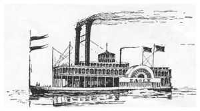The Making of the 50 States: Arkansas
Part 2: The Rest of the Story 
France regained control of the Louisiana Territory in 1800 and then sold it to the United States in 1803 in the Louisiana Purchase. After a series of devolutions created by other states' begin admitted to the Union, Arkansas became a Territory in 1819. War of 1812 hero James Miller was the first territorial governor. Official documents of the time referred to it as the Arkansaw Territory. Spelling variations persisted until 1822, when the spelling used consistently used in the newspaper Arkansas Gazette prevailed. Little Rock was chosen as the territorial capital in 1821. A steamboat, the Eagle, arrived there, along the Arkansas River, in 1822; soon steamboats plied their trade on other rivers in the state. Relations between Native American settlers and American, British, French, and Spanish settlers waxed and waned over the years. Initially, some tribes accepted French traders in their midst because of the exchange of goods that their presence made possible. The need for European settlers to claim more and more land, however, brought them increasingly into conflict with Native Americans. Fort Smith was built in 1818 as a method of keeping the peace. American settlers negotiated a series of treaties with the various tribes still living in Arkansas in the 19th Century; most of these treaties were eventually disregarded. More and more Native Americans made their way west, to what in the early 19th Century was still Indian Territory (and is now Oklahoma). 
When the statehood petition of neighboring Missouri was delayed by a debate over whether to allow slavery in new states, many settlers (and many of them slaveholders) moved from Missouri to Arkansas. The owners of large slave-powered plantations in southeast Arkansas succeeded in keeping their right to hold slaves when Arkansas joined the Union, on June 15, 1836. First page > In the Beginning > Page 1, 2
|
|
Social Studies for Kids
copyright 2002–2026
David White




